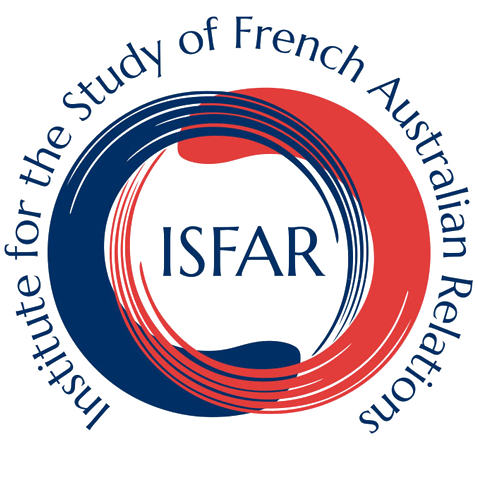Message from the president
In this first edition of the newsletter for 2024, you will find details of the recently published French Australian Review 75, which features several refereed articles from last year’s ISFAR Symposium and which was guest edited by Co-Chairs of the ISFAR Research Committee, Elizabeth Rechniewski and Alexis Bergantz, in collaboration with the journal’s Editors, Elaine Lewis and Jane Gilmour.
This edition also features write-ups of some noteworthy events. The first of these is the visit to Melbourne last December by Minister for Europe and Foreign Affairs of the French Republic, Catherine Colonna, during which she launched various initiatives as part of a new France-Australia roadmap. Some of you perhaps participated in one such initiative, the Night of Ideas (La Nuit des Idées) held for the first time in Melbourne, at the NGV on 1 March. Another important event was the recent launch by the Honorary French Consulate in Melbourne and the Association of French Teachers of Victoria (AFTV) of the education kit “N’oublions jamais”, inspired by the life of French-speaking Holocaust survivor Esther Wise. The 20-minute documentary will be of interest to everyone, independently of the excellent educational kit which accompanies it.
You will also find below news and contributions from ISFAR members, notices of some new books which are sure to be of interest (including a forthcoming edited volume in honour of ISFAR founder and Past President, Emeritus Professor Colin Nettelbeck), and a number of forthcoming events and exhibitions, notably Gauguin’s World at the National Gallery in Canberra opening late June, and Paris: Impressions of Life 1880–1925 opening soon at Bendigo Art Gallery (see below for how to win a free double pass to the exhibition). Of course, you will not have time to do any of the above until after the Alliance Française French Film Festival, which celebrates its 35th anniversary this year!
Bon Festival et bonne lecture!
The French Australian Review
The editors are pleased to announce the publication of The French Australian Review, Summer Issue, 2023–2024, Number 75. This issue features a number of refereed articles first presented as papers at the ISFAR Symposium, ‘New Perspectives in French-Australian Studies’, held in April 2023. Elizabeth Rechniewski and Alexis Bergantz are Guest Editors for this issue and their Introduction reflects on the changes the world has undergone since the first issue of Explorations, the predecessor to the present review, in 1985.
Nic Maclellan’s ‘Silenced Voices of the Indo-Pacific’ is followed by Matthew Graves’ ‘L’Île du Géographe Revisited: Unofficial Diplomacy in Post-Federation French-Australian Relations’. Paul Kiem and Alexis Bergantz’s studies of ‘The Huybers and Loreiro Families’ and ‘Ann Robson, French Government Travelling Scholar, Translator and Lifelong Francophile’ respectively, demonstrate how ‘transnational life-writing’ can open up fresh perspectives on larger themes. These are followed by articles by Vanessa Castejon and Alice Duncan who explore the persistence of colonial stereotypes of Indigenous Australians in the literature and culture of former imperial powers through an analysis of the representation of Aboriginal art and culture in a selection of children’s books published in France.
These are followed by Book Reviews and the usual Bibliographical Notes.
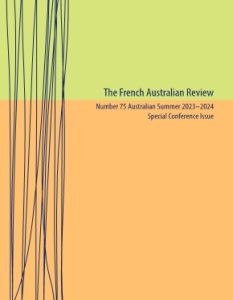
24th George Rudé Seminar
The 24th George Rudé Seminar in French History and Culture will be held on Tue 11 – Wed 12 July 2024 at Macquarie University, Sydney.
Keynote speakers include Adrian Muckle (Victoria University, Wellington): Kanak voices in the history of France’s “native code” in New Caledonia: the “indigènes” in the “indigénat”; and Julie Kalman (Monash University): The Asterix series as national myth in post-war France.
There will be papers by several ISFAR members, an ISFAR panel and special sessions in tribute to Martyn Lyons and Robert Aldrich (Chair of the ISFAR Advisory Board).
Registration will open in early April. For more information please email
Volume in honour of Emeritus Professor Colin Nettelbeck
Dear colleagues
Many of you will be aware that a Festschrift in honour of Emeritus Professor Colin Nettelbeck will be published later this year by Classiques Garnier. Entitled Franco-Australian Connections: Essays in Honour of Professor Colin Nettelbeck, the volume features contributions from colleagues who were fortunate enough to know Colin personally and to work with him during his time at The University of Melbourne and at Monash University. We all continue to benefit from his legacy to French Studies in Australia.
An opportunity exists for colleagues to pay their respects to Colin in a formal and lasting way by having their name included in the tabula gratulatoria that will feature at the end of the Festschrift. If you would like to have your name included in the tabula gratulatoria, please email
Please forward this invitation to any other colleagues and/or friends who may be interested in having their name included in the Festschrift. Contributors to the tabula gratulatoria will receive favourable pricing on the published volume.
Andrew McGregor
French Studies
The University of Melbourne
News from our members
In 2023, author/performer and ISFAR member Jayne Tuttle attended two prestigious artist residencies in France
After attending the launch of her second book, My Sweet Guillotine, at the Hôtel du Nord in Paris, with Franco-American writer Lauren Elkin and booksellers Shakespeare & Company, Jayne was selected as one of ten global artists to attend a sponsored residency at the La Napoule Art Foundation in March. Situated in Mandelieu-la-Napoule on the Côte d’Azur, the residency gives a group of multidisciplinary artists the chance to develop their work and exchange ideas within the historic setting of the Château de La Napoule. Among sculptors, performers, painters and writers from Iran, Korea, India, Japan, the USA and France, Jayne worked on her third book, while also adapting the theatrical version of her first book, Paris or Die, to suit a French audience. At the end of the residency an Open Studio event was hosted for colleagues and friends of the Foundation, and the local public, at which Jayne performed a section of the play.
Later in the year, Jayne received a grant from the Ville de Paris to attend a month’s residency at the Résidence des Récollets. The residence, situated in the 17th century Couvent des Récollets, was founded in 2023 as a home of exchange and creation for international artists and researchers. As one of the original artists to take up residency at Les Récollets, Jayne and her family were invited to return to celebrate the centre’s 20th anniversary, in the company of other long-term residents such as writer Dany Laferrière OC OQ, film director Frederic Wiseman and musician Keziah Jones. In early October, Jayne performed Paris or Die in the ancient Chapelle des Récollets, to an enthusiastic audience. Jayne’s husband Matt, a musician, and their daughter Frankie – known as an ‘enfant des Récollets’ – also performed at the festival.

Jayne Tuttle with writer Lauren Elkin at the launch of her second book
Credit: Tariq Krim
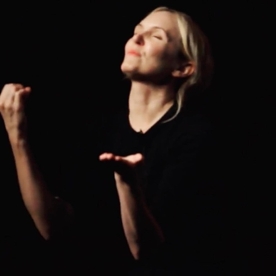
Jayne Tuttle performing Paris or Die at Les Récollets
Credit: Cemil Yildiz
Dr Edward Duyker’s book, Horace Street Green: A Personal Past, received one of three ‘Commendations’ in the Community Diversity Award category in the Victorian Community History Awards announced on Fri 2 Feb 2024.
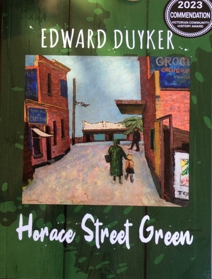
The book is about growing up in in the Melbourne suburb of Malvern, the eldest of eight children with a Dutch father, a Mauritian mother and an extended francophone family (retaining ties with France).
The awards were presented by Judy Maddigan, who was the first woman to become Speaker of the Victorian Legislative Assembly. She was the ALP state member for Essendon until 2010.
Edward Duyker is a long-time ISFAR member and contributor of many articles to The French Australian Review. His book is available from the Royal Historical Society of Victoria bookshop.
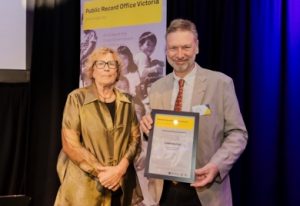
Dr Duyker receiving his award from Judy Maddigan
Credit: Claryssa Humennyj-Jameson, ISKA PHOTOGRAPHY
After 40 years of secondary teaching, Phillippa Neal has retired. Having taught at St Arnaud High School, Lycee Bernard Palissy in Gien, Trinity Grammar School, and Geelong Grammar School, Phillippa taught Les Femmes Tondues and A la recherche de La Pérouse to senior students for many years.
French at Monash University involved lectures and tutorials with Colin Nettelbeck, Wallace Kirsop, Natasha Landau, Anne Murch and Eunice Leong. It was also the beginning of ISFAR. Phillippa was the secretary of ISFAR from 1997 to 2002 during the presidency of Dr Alistair Hirst. She was delighted to work with Dianne Reilly, John Drury, Colin Thornton-Smith and Jacques de Saint Ferjeux on the ISFAR committee.
Phillippa’s passion remains French naval exploration in the South Pacific. Having visited New Caledonia over 20 times, Phillippa has been able to increase her knowledge of La Pérouse, D’Entrecasteaux, Baudin and Peron. This has also involved dipping into funds to purchase maps and charts from Librarie Bail on Ile de la Cité.
France-Australia Roadmap
On 5 December 2023, Minister for Europe and Foreign Affairs of the French Republic, Catherine Colonna, launched the French Australian Cultural Exchange Foundation (FACEF) during her visit to Melbourne. At a lunch hosted by the National Gallery of Victoria, Minister Colonna revealed this wonderful initiative, highlighting the importance of cultural diplomacy and friendship in all its facets.
The topic of plurilingualism and the French language was highlighted too. Australia hosts twenty-nine Alliances Françaises, with a legacy lasting up to 130 years. The depth of the French-Australian cultural connection and historical friendship cannot be understated.
Minister Colonna emphasised FACEF’s reinvention of the traditional ‘villa’, or artist residencies, which have resulted in dynamic artistic creation and promote artistic dialogue between cultures. She said that Australia today represents a spirited crossroad of the artistry associated with the ‘Villa Albertine’ residency program in the United States. The good work of promoting French artworks in Australia, and likewise showcasing Australian Indigenous art in Europe through the partnerships with institutions such as le Musée du Quai Branly – Jacques Chirac, or Centre Pompidou, has been wonderful, and will only grow.
FACEF will facilitate the deepening of exchanges between artists, thinkers, creators, educators, emerging talents, writers, and more, all the while strengthening existing links with institutions like the NGV. The French Republic will generously contribute two million Australian dollars in endowment and full-time staff support to the initiative.
FACEF flagship projects
Minister Colonna also announced FACEF’s four starting flagship projects! These projects include a cross-residency of photographers between Marseille and Perth, a program for emerging artists, and two residency schemes. The first residency scheme will promote artistic links between Australia and New Caledonia, represented by the Tjibaou Center, and the second will strengthen links between the Aboriginal centres of northern Australia and those in France. For each project, the Foundation will be seeking at least one Australian partner institution.
A pathway to greater engagement in the network of residencies was proposed, extending not only to New Caledonia, French Polynesia and Wallis et Futuna, but to even more Pacific Island countries.
Lastly, Minister Colonna urged the audience, composed of international cultural leaders, to become the Foundation’s future ambassadors, building a wonderful FACEF together. Minister Colonna acknowledged and thanked all the Australian curators and heads of the institutions linking Australia and France’s rich cultures. She also thanked the Foundation’s Inaugural Chair, Myriam Boisbouvier-Wylie who passed her thanks to the Foundation Board members, Krystyna Campbell-Pretty, John Landerer, Lorraine Tarabay and Tom Mosby.
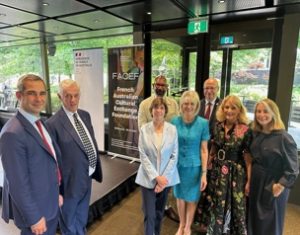
Front row: Boris Toucas, John Landerer, Catherine Colonna, Myriam Boisbouvier-Wylie, Krystyna Campbell-Pretty, Karine Mauris
Second row: Tom Mosby, Jean-Pierre Thebault – Absent: Lorraine Tarabay
Credit: Bleu Blanc Rouge
Other French-Australian Initiatives
Announced on the same day as FACEF, FACET, or the French-Australian Centre for Energy Transition, and the Military Access Agreement marked a more profound level of engagement which connects Australia and France.
Through the Military Access Agreement, Australia and France will increase defence cooperation by allowing each other’s military personnel to access each other’s bases and facilities. This agreement is part of a new France-Australia roadmap, launched by French Minister for Europe and Foreign Affairs Catherine Colonna and Australian Minister for Foreign Affairs Penny Wong at Parliament House in Canberra on 4 December. At the heart of the roadmap is a plan to increase new levels of cooperation in the Indo-Pacific, pertaining to security, climate action, education, Antarctica, critical minerals and culture and heritage.
The French-Australian Centre for Energy Transition serves as the culmination of Australia and France’s shared ambitions to uphold the Paris Agreement’s ambitions, which were reaffirmed in Dubai during COP28.
Excitingly, Swinburne University of Technology in Melbourne will be the first to implement and house one of the major initiatives of the France-Australia Roadmap. FACET will be a place to build new networks, foster new projects and grow the ecosystem of science and innovation. It will develop into a successful energy transition, focusing on training and further education. The FACET is an accelerator for training and research in the field of energy transition, as well as sharing innovation and technological sciences with the goal of fighting climate change through business-oriented solutions.
– Lachie Kappa
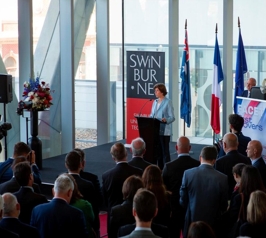
French Minister for Europe and Foreign Affairs Catherine Colonna announcing the launch of FACET
Credit: French Embassy
À l’avant-garde de la pédagogie: la franco-australienne Augustine Soubeiran
Présentation de Mme Nelly Duret
Organised by ISFAR, French and Francophone Studies at the University of Sydney and the Alliance Française de Sydney
Thursday 11 April 2024 5:30pm – 7pm
In person: Woolley Common Room N480, The University of Sydney
Online: https://uni-sydney.zoom.us/j/81328748622
All welcome to attend in person or via the link above. Please note that this event will be held in French
Augustine Soubeiran (1858–1933), who made Australia her home from 1884, is well-known for her charitable work and fund-raising during the First World War and her role in the early years of the Alliance Française. She was also the founder and co-Principal, with her colleague Louisa Gurney, of Kambala School for girls from 1891 to 1914. Noted historian Nelly Duret, the author of a recent book on Soubeiran, Augustine Soubeiran: Une Cévenole et philanthrope féministe en Australie (Ampelos, 2021), now in its second edition, will explore the roots of Soubeiran’s philosophy of education in her native Cévennes, her religious and family background, and her education and experience in teaching, to bring to life the innovative pedagogical ideas and practices of this remarkable woman.
Nelly Duret has dedicated her life to pedagogy, teaching from kindergarten to high school seniors and working with inmates at Sainte Anne prison. She pursued university studies in History and Literature and became a jury member for the recruitment of interpreter guides in Avignon, specializing in Heritage and Culture. From 1961 to 2001, she was involved in the Avignon group for Art and Popular Traditions, traveling internationally. Passionate about religious history, she has written extensively on the Vaudois in Luberon and Jews in Comtat Venaissin, receiving the “Ambassador” Prize from Avignon. Later, she focused on writing a history of Saint Jean du Gard and promoting heritage through associations and exhibitions.
More information: email
Watch: An introduction to Augustine Soubeiran.
AALITRA Translation Awards 2024 (French)
The Australian Association for Literary Translation (AALITRA) now invites entries for the 2024 AALITRA Translation Awards.
The AALITRA Translation Awards aim to acknowledge the wealth of literary translation skills present in the Australian community. Prizes are awarded for a translation of a selected prose text and for a translation of a selected poem. The focus of the AALITRA Translation Awards is on a different language each year the awards are offered.
In 2024, the focus language is French.
Texts:
– The prose text for translation is by Chantal Danjou, from D’autres que les hommes, a recent novel not yet published
– The poetry text is by Marilyne Bertoncini, unpublished poem, December 2023
Prizes:
– $500 prize for Best Prose Translation
– $500 prize for Best Poetry Translation
– $250 prizes for Honourable Mentions in each category
Prizes this year have been generously donated by ISFAR
Judges: Dominique Hecq (Coordinating Judge), Frances Egan, Penny Hueston, Brian Nelson
Awards Ceremony: At the Awards Ceremony, scheduled for 18 September 2024, winners will be awarded the above monetary prizes, together with book prizes and one year’s additional membership of AALITRA.
Prize-winning entries will be read out at the Awards Ceremony. They will also be published on the AALITRA website and in AALITRA’s peer-reviewed, open-access journal, The AALITRA Review, together with comments from each of the translators regarding their approach to translation.
Closing date: Fri 24 May 2024
Entries are to use the Submission Form. See also Conditions of Entry.
All enquiries should be sent to
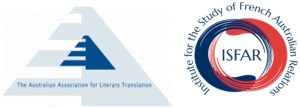
Alliance Française French Film Festival
The Alliance Française 35th French Film Festival has arrived! Now showing in capital cities and a number of regional centres around Australia.
Exhibitions and events
Paris: Impressions of Life 1880–1925 will be a journey through the streets of historic Paris, brought to life in more than 170 works of art and artisanal objects from the renowned collection of the Musée Carnavalet – History of Paris. It opens 16 March exclusive to Bendigo Art Gallery. The exhibitions reflects on the period of great social change, urban development and artistic innovation which shaped modern Paris and continues to capture the global imagination. Courtesy of the Bendigo Art Gallery, ISFAR is pleased to offer a double pass to this exhibition to the first ISFAR member to email us at .
The National Gallery of Australia in Canberra is holding a major exhibition Gaugin’s World: Tōna Iho, Tōna AO from Sat 29 Jun to Mon 7 Oct 2024. The exhibition offers a rare opportunity to experience the art of Paul Gauguin and features some of his most recognised masterpieces, many of which were created in the Pacific region. The NGV will explore Gauguin’s life, art and controversial legacy through talks, public programs, a podcast series and films.
Katrina Kell’s book Chloé (published by Echo Publishing) was launched at Young & Jackson’s in Melbourne’s CBD on 29 February. The book is a novel based on the true story of the woman who modelled for one of Australia’s most famous paintings. Katrina Kell is an Honorary Research Associate at Murdoch University.
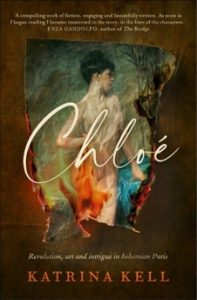
Recent articles and media
Paris: A Fabulous Food Guide to the World’s Most Delicious City by Andrew Prior is an up-to-date food exploration of Paris. More than a restaurant guide, the book takes you on a journey through Paris’s food streets to boulangeries, patisseries, boucheries, fromageries, épiceries, as well as food halls, food markets, cooking equipment stores, bouillon, bistros, wine bars and its famed passageways.
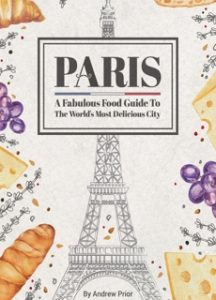
Andrew Prior is also the host and producer of the podcast Fabulously Delicious: The French Food Podcast. Andrew is a former Masterchef Australia contestant and fabulous French foodie!
Kit pédagogique “N’oubliez jamais” (Teaching resource “Never Forget”)
The educational kit “N’oubliez jamais” was officially launched by the Honorary French Consulate in Melbourne and the Association of French Teachers of Victoria (AFTV) on 28 February at the Ark Centre in Hawthorn East. The kit was inspired by the life of French-speaking Holocaust survivor Esther Wise and the publication celebrates her hundredth year. She was fifteen years old during the second World War and was seventeen when her parents were detained. She survived World War II and eventually migrated to Australia, but never saw her parents or brother again.
The project began in November 2022 – after a number of meetings between The Honorary French Consul, Myriam Boisbouvier-Wylie, Mrs Vivian Parry of the Association for Holocaust Survivors and Lucie Dickens of the Association of French Teachers of Victoria, the decision was made to record the moving testimony of Emmy Monash and Esther Wise.
The documentary film was funded by the Association of French Teachers of Victoria (AFTV) and was produced by three Swinburne Film and TV students, Antoine Hobbs (director), Ben Burr and Guy Brooks. At the premiere of the film the AFTV Vice-President Lucie Dickens spoke of the importance of the film and its impact. “As educators, we know the impact a personal story can have on students. … Through the authentic connection students can make with someone relating to a personal event, the outcome can be quite impactful, and the learning experience becomes more meaningful,” she said.
At the same time as the film was being made, a team of volunteer teachers with extensive experience in curriculum design began to assemble a complete resource.
“N’oubliez jamais” is presented on the AFTV website in the following words:
This education kit
– is based on the personal experience of a young survivor of the Holocaust in France
– is to be used alongside the twenty-minute documentary film in four parts, with or without French/English subtitles and transcripts
– may be presented as interactive and/or printable pdfs
– contains reading, listening, speaking, viewing and writing activities
– offers differentiated activities for Years 9–10 and Years 11–12
– was developed by the AFTV and is available to all AFTV members and non-members
The organisers expressed their hope that “despite our different origins, beliefs, and values, we, as human beings, deserve and must cultivate respect, compassion, and tolerance”.
View the film and other AFTV resources. Watch also on YouTube and on SBS French.
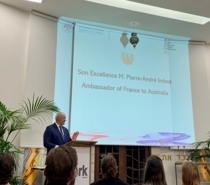
French Ambassador Pierre Andre Imbet speaks at the launch
Our thanks to Mme Myriam Boisbouvier-Wylie for permission to use the photo
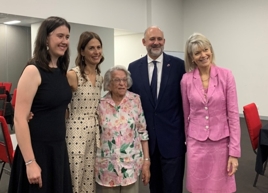
Esther Wise, the French Ambassador Pierre-André Imbet, Mme Boisbouvier-Wylie and other guests at the launch
Our thanks to Mme Myriam Boisbouvier-Wylie for permission to use the photo
Australia-France Network of Doctoral Excellence
Australia-France Network of Doctoral Excellence (AUFRANDE), coordinated by RMIT Europe, has launched its second recruitment campaign, offering 43 fully funded doctoral fellowships in co-tutelle between France and Australia in physics, photonics, chemistry, mechanics, computer sciences, geosciences, environmental sciences.
Applicants can be of any nationality.
AUFRANDE is a highly ambitious interdisciplinary doctoral program linking France and Australia, with strong support from industry. AUFRANDE seeks to recruit excellent doctoral researchers of any nationality, gender, and background from around the world.
AUFRANDE offers the recruited researchers an outstanding experience with excellent working conditions, including full-time employment contract in France with attractive salaries including social security benefits, a unique international research environment, and an innovative research training program in which they will deepen core scientific skills and develop new ones in complementary disciplines and sectors.
International mobility is a core feature of the program with a residential year in Australia and participation in regular events where researchers share common experiences and build a sustainable community, laying a strong foundation for long-term impact on future collaborations and careers.
IMPORTANT:
Applicants must NOT hold a PhD and must have not lived in France for more than 12 months over the past 3 years (i.e. since 24 January 2021)
See details of the application process and open positions.
Contact Us at ISFAR
ISFAR: isfarinc@gmail.com
The French Australian Review: french.australian.review@gmail.com
ISFAR Research Committee co-chairs: alexis.bergantz@rmit.edu.au;elizabeth.rechniewski@sydney.edu.au
Join ISFAR or renew your ISFAR membership. Membership includes subscription to The French Australian Review journal.
Follow us
Facebook: www.facebook.com/FrenchAustralianRelations
Twitter: https://twitter.com/theISFAR
Useful links
Alliance Française de Melbourne www.afmelbourne.com.au
Association of French Teachers in Victoria (AFTV) www.aftv.vic.edu.au
Australian-French Association for Research and Innovation (AFRAN) www.afran.org.au
Australian French Association for Science and Technology https://afas.org.au
Australian Historical Association www.theaha.org.au
Bastille Day French Festival Melbourne www.bastilledaymelbourne.com
Bleu Blanc Rouge (Consular newsletter) www.bbrvic.com/en
French Assist Melbourne www.frenchassistmelbourne.org.au
French Australian Chamber of Commerce www.facci.com.au
ISFAR resources
ISFAR provides resources to researchers in the field of French-Australian studies, with the support of the authors or contributors who give their approval to publish this material. Access all ISFAR resources www.isfar.org.au/resources
